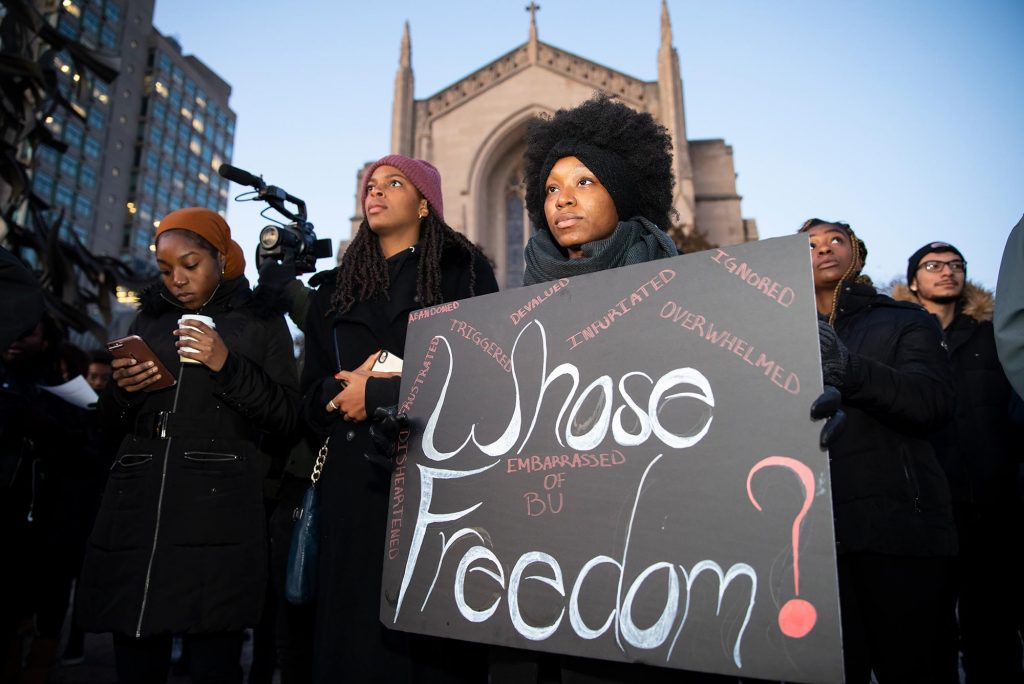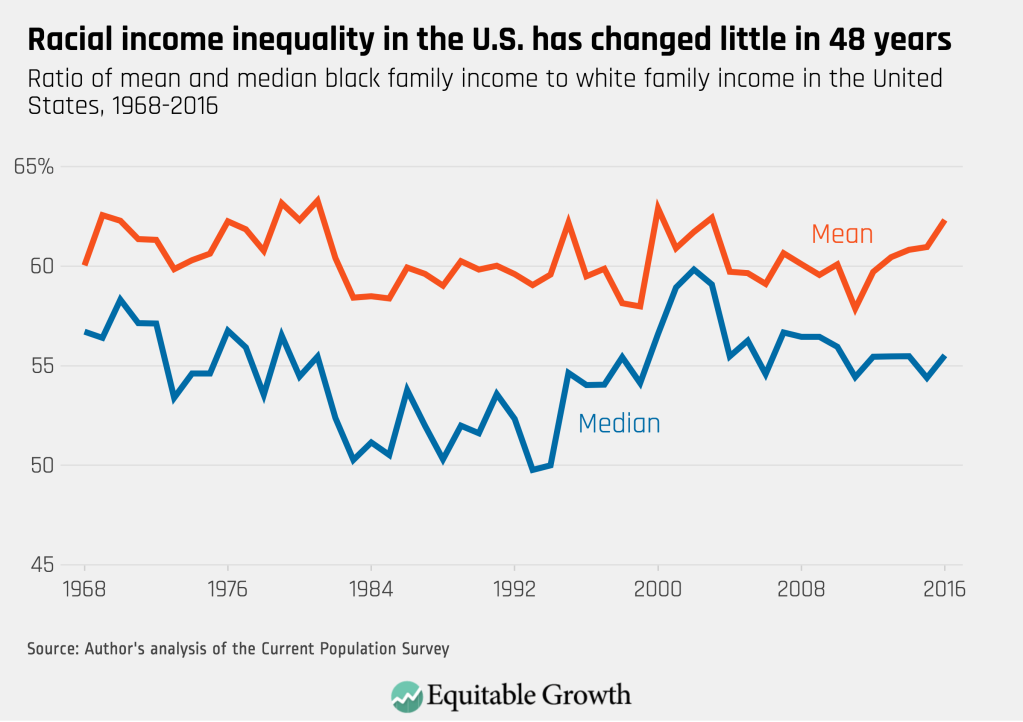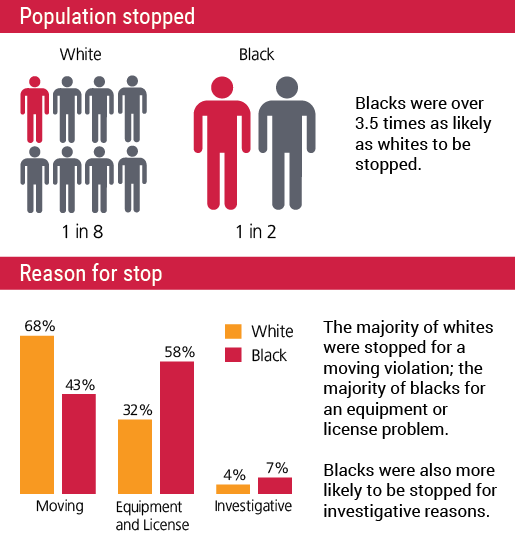By Nia Hoq
“Forgetting the past, or refusing to see it, to understand it and to grapple with it, is as sure a path as there is to tearing the present apart.”
Whether you want to face it or not, the effects of slavery still linger in our society. The continuing oppression of African Americans is a testament to how slavery makes itself known in many aspects of society. Avery Gordon, in her well known theory, describes haunting as “one way in which abusive systems of power make themselves known and their impacts felt in everyday life, especially when they are supposedly over and done with, or when their oppressive nature is continuously denied.” This is especially evident with slavery in America, as this experience is one that haunts us still; even if it is technically over, its aftermath is still unfolding today.
But Ben Shapiro wants you to believe otherwise.
Recently, Ben Shapiro, a conservative political commentator and author, gave a talk at BU titled “America Wasn’t Built On Slavery, It Was Built On Freedom.” This event sparked a lot of outrage among students, especially with a group called Black BU, who protested Shapiro’s appearance due to his past controversial statements and the content of the talk itself. As a student at BU myself, I was shocked at many aspects of the speech. My first instinct was to have an emotional reaction. However, since Shapiro often prides himself on only using logic and reasoning, I felt the best way to highlight the problematic nature of the speech was to break it down and show the immense flaws in his logic.
So, here are four of Shapiro’s arguments that prove his attempt to deny the continuing oppression of African Americans today.
1. “America is one of the least racist multiracial countries today.”
Wow. Let’s unpack this one, shall we? In his argument, Shapiro mentions how countries in the UK are more inherently racist than the US, and one reason he cited was the fact that these countries have never elected a black president. Although it may be true that other countries in Europe have an issue with racism, Shapiro clearly uses a straw-man argument by pointing the finger at these countries so as not to face the clear race issues occurring in the US in the present. Simply put, just because other countries are racist doesn’t mean that America isn’t. Additionally, by claiming that because we elected a black president, we do not have an issue of racism in this country, Shapiro denies the oppression faced by many African Americans- as seen in our justice system, educational gaps, and socioeconomic inequality. Yes, electing a black president was a major step in the right direction, but that doesn’t mean the work ends there. The exception does not speak for the majority- and it is important to remember the continuing struggles faced by the black community.
2. “It is economically illiterate to suggest that America’s economy is rooted in slavery.”
This quote is flawed in many ways- starting with the fact that it’s simply not true. America is currently one of the most powerful and independent nations in the world- but it didn’t start out that way. At the time the Constitution was signed in September 1787, there were about half a million slaves in the US, making up approximately 13% of the population. During the 19th century, slavery was the backbone of the southern economy, which produced the US’s number one export- cotton. Shapiro claims that because the US is so industrialized and modern rather than agricultural, slavery was not essential; but what he fails to mention is that the reason the US was able to industrialize so rapidly was due to the economic profit provided through the cotton industry. As cotton grew as an export, many entrepreneurs opened factories in the South, which led to the expansion of the Industrial Revolution into Southern states. This is clearly an attempt by Shapiro to dissociate our current economic system from the remnants of slavery. It is clear, however, that our economy was built by slaves.
3. “The continuation of income disparity among races in the United States is overwhelmingly not due to racism, Jim Crow, or slavery…Such disparities are due, in the main, to individual decision-making.“
This is not an opinion unique to Ben Shapiro- as many on the right believe that the current socioeconomic disparities among races and classes are due to individual lack of effort rather than deep-rooted flaws in the system. However, since 1980, the ethnic disparities between blacks and whites have largely remained unchanged, as one in four African Americans are classified as poor, as opposed to one in ten white Americans. This disparity is also seen in unemployment rates, the health sector, and wealth gaps. Since 2000, the unemployment rate for black men has been 11-15 points lower than that of white men, and on average for every dollar owned by the median white family, the median black family has less than 8 cents. It is difficult to say that the reason for these clear differences in inequality are simply due to black people not ‘working as hard,’ as the legacies of slavery are clear here. The atrocity of slavery has left a massive difference in land distribution among blacks and whites, which is theorized to be at the root of many income and wealth differences. African Americans are still struggling to combat the systematic oppression that keeps them lagging behind economically, but Ben Shapiro wants you to accredit these disparities to mere laziness.
4. “The criminal justice system was indeed biased against black Americans, with law enforcement agencies acting as agents of segregation and racism. But that doesn’t explain why black-on-black crime is so high today”
Yes, the criminal justice system used to be heavily biased against African Americans. But it still is, and citing black on black crime doesn’t change this fact. There are countless instances of police officers showing bias against African Americans- as seen in heartbreaking videos of cops shooting unarmed black teenagers, as well as the massively disproportionate incarceration rates between African Americans and whites. The National Registry of Exonerations reports that black people are about five times more likely to go to prison for drug possession than white people, and are 12 times more likely to be wrongly convicted of drug crimes. The statistics showing the discrepancies between treatment of white and black people in the US justice system go on and on, and it is clear that black people are still treated unfairly within this system to this day. Ben Shapiro again utilizes a straw-man argument by pointing the finger at black on black crime in order to deflect from the present racism within our justice system.
While it may be true that slavery does not solely define American principles, Ben Shapiro claiming its impacts don’t remain in today’s society is harmful. It denies the continuing oppression of African Americans and allow for people to not contribute to solving the problem, as they believe there is no problem to solve. Without acknowledging slavery’s lasting legacy, it is impossible for our society to effectively move on from this atrocity, as we will continue to be haunted by it. It is important to combat these harmful views by educating people in an historically conscious way about slavery and its lasting impacts in today’s society.





I love the points you made in this article, especially because you rebutted his “facts” with statistics that prove him wrong. His speech was troubling for me, especially the comment about “individual differences”, which seemed to condone racist stereotypes. I was also disappointed that BU spent thousands of dollars to allow him to speak. Do you think that educational institutions have a responsibility not to platform for individuals who espouse racist and potentially harmful beliefs?
LikeLiked by 1 person
I agree with you! Though I believe everyone should have the ability to voice their opinions, I do not believe he should have been given a platform to speak at BU considering the harmful impact his words had, especially at a university with so much history (considering Martin Luther King Jr. graduated from here). To allow Shapiro to come and attempt erase the experiences faced by African Americans at BU seems to go back on all the progress the school has made in promoting diversity. Shapiro does have free speech- I just feel that he should have exercised it elsewhere, such as on his own podcast or show.
LikeLike